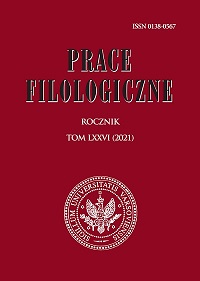Perspektywy poszerzenia badań nad relacją między językiem a kulturą o analizy humoru. Na przykładzie stereotypu „madki” w memach internetowych
Towards Expanding the Research on the Language – Culture Interaction into Humour Analyses. The Case of the Stereotype of “madka” in Internet Memes
Author(s): Agnieszka LiburaSubject(s): Sociolinguistics, Sociology of Culture, Social Norms / Social Control, ICT Information and Communications Technologies
Published by: Wydział Polonistyki Uniwersytetu Warszawskiego
Keywords: stereotype; mother; humour; meme; culture;
Summary/Abstract: As many humour researchers have pointed out, jokes usually explore various questions that are significant from the point of view of a given society, or even sociocultural issues that are of utmost importance to a certain group (cf. e.g. Kuipers 2008). I claim that contemporary forms of displaying humour, such as Internet memes, may serve as a seismometer indicating essential changes taking place at the language – culture frontier. The stereotype of “madka,” unveiling before our eyes in the Internet humour, serves as a case in point. Contrary to the stereotype of mother that has already been well explored in Polish studies on language and culture, the stereotype of “madka” is negatively charged. The analysis of corpus encompassing 300 memes suggests that “madka” is conceptualized as a person who is raising at least one child, who is unemployed, poorly educated and entitled, who benefits from the 500+ child-support programme, and who is extremely stupid. The paper elaborates on the sociocultural context within which the new stereotype – widely divergent from the much-idealized view of mother – has emerged. The conclusions indicate the ways in which humour analyses may inform the ongoing studies on the interrelations between language and culture.
Journal: Prace Filologiczne
- Issue Year: 76/2021
- Issue No: 1
- Page Range: 321-346
- Page Count: 26
- Language: Polish

